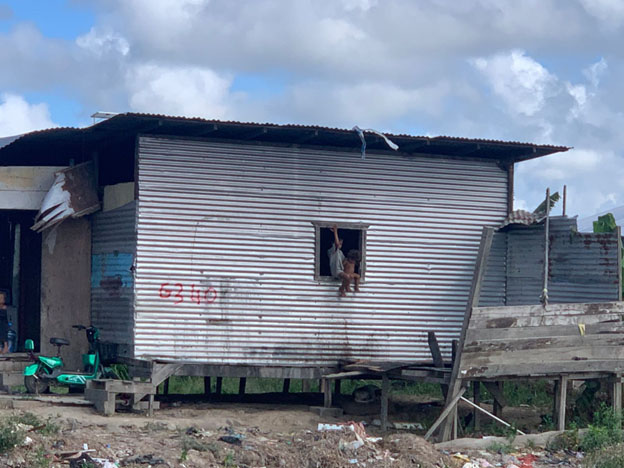In response to the tragic drowning of three-year-old Venezuelan Marco Ezequiel Palma Perez in Ruby, Opposition Member of Parliament Ganesh Mahipaul has condemned the PPP/C government for its failure to address the growing migrant crisis with urgency, compassion, and responsibility.
The three-year-old drowned while living in squalid conditions in the Ruby squatting area and has drawn renewed attention to the administration’s inaction regarding the Venezuelan migrant influx. Mahipaul, speaking with Stabroek News, described the death as a “direct result” of the government’s failure to address the plight of migrants seeking refuge in Guyana.
“This heartbreaking tragedy is not an isolated event, but a clear reflection of the PPP/C government’s complete disregard for the safety and well-being of both migrants and Guyanese citizens,” Mahipaul declared. “The death of little Marco is a devastating reminder of the systemic failure at the highest levels of government, which has been unresponsive to the plight of thousands of migrants fleeing the economic collapse in Venezuela.”
The tragedy in Ruby has highlighted the dire living conditions many migrants face in Guyana. Families forced to live in overcrowded, unsanitary conditions, with little access to basic services such as healthcare, education, and clean water, are becoming more common as the migrant crisis deepens, the MP said. He added that the government’s lack of action not only violates Guyana’s international obligations under various treaties but also exacerbates tensions between migrants and local communities, creating a volatile situation that threatens social cohesion.
“For years, the PNCR has called on the government to take meaningful action, from conducting a comprehensive registration of migrants to providing basic rights like access to education and healthcare,” Mahipaul continued. “But the PPP/C has failed to provide any coherent policy or framework to address these issues. Migrants continue to live in dangerous and degrading conditions, while the government does nothing.”
The Ruby settlement, where the child tragically died, he said, has become a symbol of this ongoing crisis. Reports from the area paint a grim picture of overcrowded squatting, environmental degradation, and a severe lack of basic services. Local residents have spoken of the strain placed on the community by the arrival of large numbers of migrants, many of whom are living in makeshift shelters and are vulnerable to health risks and exploitation.
Despite the clear signs of a humanitarian emergency, Mahipaul stressed, the PPP/C government failed to prioritize the migrant crisis, forcing ordinary citizens and local NGOs to step in with donations of food, water, and shelter. “While the kindness of the Guyanese people is admirable, it cannot replace the need for a structured, government-led response to this crisis,” he said.
The opposition, according to Mahipaul, has outlined a comprehensive set of policy proposals to address the migrant situation. These proposals, Mahipaul said, include a comprehensive registration and data collection system to ensure all migrants are properly documented, with accurate data collected for future planning and resource allocation. They also call for the government to honour Guyana’s international obligations by providing migrants with basic rights, including access to healthcare, education, and safe living conditions. The opposition further advocates for creating systems that ensure both Guyanese citizens and migrants benefit from the country’s growth, promoting peaceful coexistence and equal opportunities for all. Addressing environmental and social challenges such as overcrowding and proper housing, as well as ensuring resource allocation, would be key to preventing the strain on local communities, he said. Additionally, the opposition supports collaboration with international partners to secure funding and assistance to help address the broader social impacts of the crisis.
“We must remember that Guyana is a country of opportunity, not just for its citizens, but for those who seek refuge from hardship,” Mahipaul concluded. “The PNCR/APNU is committed to creating a structured, humane framework that not only addresses the immediate needs of migrants but also ensures long-term stability and prosperity for all people in Guyana—whether they are local citizens or refugees.
“This is a tragedy, yes. But the true tragedy is the government’s failure to prevent such deaths and to protect those who come to our shores seeking refuge.”
Mahipaul pledged that under a future PNCR-led government, Guyana would become a “beacon of hope” for all who seek a better life.









